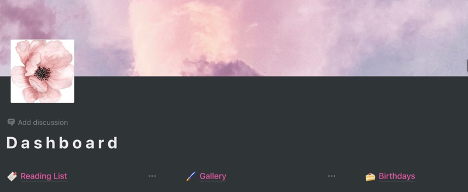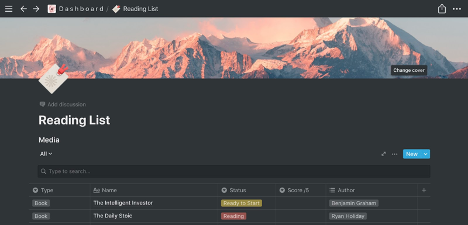By: Mahir Sadad ‘23

College can be stressful, enlightening, and amazing all at the same time. If you’re like me, we’re always caught in the frenzy of balancing between classes, clubs, and finding opportunities to expand our horizons. I used to swear by a paper planner. If I were to lose anything, it better not be my planner.
However, paper planners have their limits:
- Can get wet or damaged with no backup
- Surprisingly overpriced ($25-$30 for a notebook?!)
- No easy way to move things around
- Sometimes the pages or layouts aren’t useful
- Added clutter and weight
I wanted the all-in-one experience, and freedom of a planner, but also the ease and accessibility of digital. In my search I tried a lot of combinations, Google Calendar, Keep, Notes on my phone and Calendar apps that come with our Mac computers. However, I still wished for an all-in-one solution. That’s when I stumbled across an app called Notion in an email from an advisor.

First impressions of Notion are that it’s very minimal and clean, there is a dark mode option available, and the app’s settings and controls are simple and easy to find. It’s organized into pages, and like an endless matryoshka doll, more pages can be stuffed within pages. It’s also available on Windows, iOS, Mac, and Android, so your information can be synced across multiple devices.
Just click on the “+” and open up a page, and it gives you suggestions on what can be done with the page. Type “/” and you get a list of options. Unsure where to start? Notion’s website has hundreds of templates, from class notebooks to an engineering wiki to get you going. It’s one of the most modular apps I’ve ever found, it can be endlessly customized to your liking. Information is organized in blocks, so just click on a chunk and move it wherever you want.

The 3 biggest features I love about Notion are the ability to embed literally anything, plethora of databases, and it’s unobtrusive design. I’ll explain each feature in detail below.
Embed:
Within any notion page, you can insert links from websites, add PDFs, images and other documents. In short, if there is a link, it can be embedded. I use embed features to link in Khan Academy videos into my notes, so if I don’t get a concept, an explanation it is right there. If your Notion setup becomes elaborate, the breadcrumbs feature allows you to pinpoint locations of pages.
Databases:
This is a very extensive feature of Notion. Basically, There are 5 major types of databases you can create inside Notion:
- List
- Gallery
- Table
- Board
- Calendar
You can add properties to categorize your information. For example, in my reading list, I edited the property for the status column with tags I like. Lists and tables are just like Excel or Google Sheets files. I’m using a list database right now to research and organize internships. Boards and Calendars are great if you want to organize a lot of visual info, you can even schedule reminders within them. The best part is you can change your database seamlessly into all the 5 types with a click of a button.

Design:
While this is more of a personal preference, I prefer the uncluttered design, you can add personal touches via a page banner and emojis. No silly extras, it just works. I have noticed zero lag when starting the app, even if I have huge info-packed pages of notes. For me, the cleanliness of my notion pages just can’t be beat.
The best tools are the ones that let you just pick it up and get to work. While Notion tales a while to get used to, I found it to be an invaluable asset, especially as schedules will only get busier. Take a week of this quarantine to try it out, see if you like it. While Notion has a subscription-based model, it’s completely free with a .edu email, so make sure to use your Macaulay emails at registration. Their YouTube channel also has some helpful tutorials.
Good luck!
Interested in writing a blog for the Career Development blog? It’s open to Macaulay students and alums. If you would like to contribute or have any questions, feel free to email Jamie.Ruden@mhc.cuny.edu.